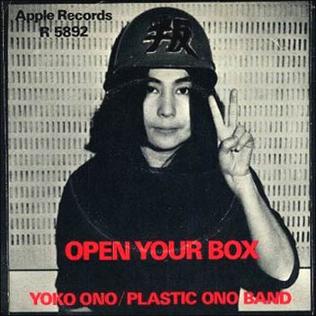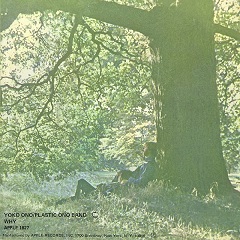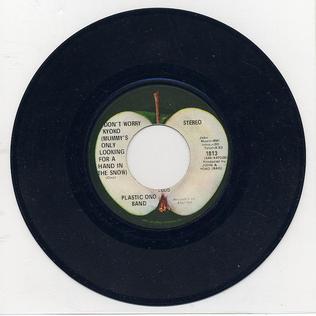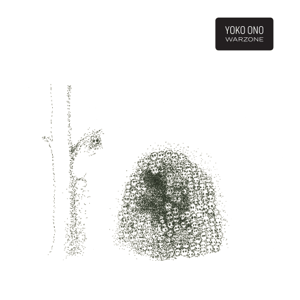
Some Time in New York City is a part-studio, part-live double album by John Lennon and Yoko Ono as Plastic Ono Band that included backing by the American rock band Elephant's Memory. Released in June 1972 in the US and in September 1972 in the UK on Apple Records, it is Lennon's sixth album to be released under his own name, and his fourth with Ono. Like Lennon's previous solo albums, it was co-produced by Lennon, Ono and Phil Spector. The album's agitprop lyrics are politically charged compared to its predecessors, addressing political and social issues and topics such as sexism, incarceration, colonialism, and racism.

Live Peace in Toronto 1969 is a live album by the Plastic Ono Band, released in December 1969 on Apple Records. Recorded at the Toronto Rock and Roll Revival festival, it was the first live album released by any member of the Beatles separately or together. John Lennon and his wife Yoko Ono received a phone call from the festival's promoters John Brower and Kenny Walker, and then assembled a band on very short notice for the festival, which was due to start the following day. The band included Eric Clapton, Klaus Voormann, and drummer Alan White. The group flew from London, and had brief unamplified rehearsals on the plane before appearing on the stage to perform several songs; one of which, "Cold Turkey", was first performed live at the festival. After returning home, Lennon mixed the album in a day.

Wedding Album is the third and final in a succession of three experimental albums by John Lennon and Yoko Ono. It followed Unfinished Music No. 1: Two Virgins and Unfinished Music No. 2: Life with the Lions. In Britain, the album was released credited by "John and Yoko", without last names mentioned. In the United States, it was released credited by "John Ono Lennon & Yoko Ono Lennon."

Unfinished Music No. 2: Life with the Lions is the second of three experimental albums of avant-garde music by John Lennon and Yoko Ono, released in May 1969 on Zapple, a sub label of Apple. It was a successor to 1968's highly controversial Unfinished Music No. 1: Two Virgins, and was followed by the Wedding Album. The album peaked in the United States at number 174, 50 places lower than the previous album. The album, whose title is a play on words of the BBC Radio show Life with The Lyons, was recorded at Queen Charlotte's Hospital in London and live at Cambridge University, in November 1968 and March 1969, respectively. The Cambridge performance, to which Ono had been invited and to which she brought Lennon, was Lennon and Ono's second as a couple. A few of the album's tracks were previewed by the public, thanks to Aspen magazine. The album was remastered in 1997.

It's Alright (I See Rainbows) is the sixth solo album by Yoko Ono, and her second release after the murder of husband John Lennon. As a variation of a theme concerning its predecessor, the back cover features a transparent image of Lennon in a then-contemporary photo of Yoko and Sean, depicted in Central Park. Released in 1982, all songs were written, composed, arranged, produced, and sung by Ono. It charted at #98 in the US.

Onobox is a 1992 comprehensive 6-disc collection of Yoko Ono's work from 1968 to 1985. The discs are grouped by era and theme. Disc one centers around the albums Fly and Yoko Ono/Plastic Ono Band, while Disc two features nearly the entirety of Approximately Infinite Universe in a different running order and most of the tracks remixed exclusively for this boxed set. Disc three features the entire Feeling the Space project, which was originally conceived and recorded as a double album before being edited down, while disc six is the previously unreleased 1974 album A Story, which was later reissued separately with an expanded track listing, along with the rest of Ono's back catalogue.

Season of Glass is the fifth studio album by Yoko Ono, her first solo recording after the murder of her husband John Lennon. Season of Glass, released in 1981, reached number 49 on the US Billboard 200 albums chart, making it Ono's highest-charting solo album to date.

A Story is an album by Yoko Ono, recorded in 1974, during the "lost weekend" sessions in which John Lennon produced Walls and Bridges. It was unreleased until the 1992 box set Onobox, which featured material from A Story on disc six. It was only properly released as an individual album 23 years later in 1997, with the reissuing of Ono's back catalogue by Rykodisc. The reissue added three bonus tracks, including home demos and a live recording from the Starpeace tour.

Yoko Ono/Plastic Ono Band is the debut solo studio album by Japanese artist and musician Yoko Ono, released on Apple Records in December 1970 alongside her husband's album John Lennon/Plastic Ono Band. Ono's album features her vocal improvisations against backing by the Plastic Ono Band, with the exception of the track "AOS", which is backed by the Ornette Coleman Quartet.
Imagine is a 1972 feature-length music film by John Lennon and Yoko Ono, filmed at their Tittenhurst Park home in Ascot, England, and in various locations in London and New York between May and September 1971. All the songs from Lennon's 1971 Imagine album appear in the soundtrack, and also the songs "Mrs. Lennon", "Mind Train", "Don't Count the Waves" and "Midsummer New York" from Ono's 1971 album FLY.

"Open Your Box" is a The Plastic Ono Band song by Yoko Ono, released on 12 March 1971 as the B-side of John Lennon's single "Power to the People". Lennon played guitar and produced the song.

Approximately Infinite Universe is the third solo album by Yoko Ono, released in early 1973 on Apple Records. A double album, it represents a departure from the experimental avant garde rock of her first two albums towards a more conventional pop/rock sound, while also dabbling in feminist rock. It peaked at number 193 in the United States. The 1997 CD reissue on Rykodisc added two acoustic demos of songs from this era, that were later released on 1981's Season of Glass. It was released again by Rykodisc in 2007.

Feeling the Space is Yoko Ono's fourth solo album, her last one on Apple Records.

Starpeace is a 1985 concept album by Yoko Ono, designed to spread a message of peace around the world as an opposition to Ronald Reagan's "Star Wars" missile defense system. As with most Ono albums, it did not chart extensively but the single release of "Hell in Paradise" reached #16 on the US dance charts. The album was subtitled An Earth Play for Sun and Air in the booklet and on the disc.

"Mrs. Lennon" is Yoko Ono's first single from her second studio album Fly, released in 1971. It was written and performed by Ono, and produced by Ono and her husband John Lennon. It includes the B-side "Midsummer New York". "Mrs. Lennon" was featured in the 1972 film Imagine.

"Why" is a song written by Yoko Ono that was first released on her 1970 Yoko Ono/Plastic Ono Band album. In the U.S. it was also released as the B-side of John Lennon's "Mother" single, taken from his John Lennon/Plastic Ono Band album.

"Midsummer New York" is a song written by Yoko Ono that was released as the opening song of her 1971 album Fly and also as the b-side of the single "Mrs. Lennon."

"Don't Worry Kyoko (Mummy's Only Looking for Her Hand in the Snow)" (also known as "Don't Worry Kyoko (Mummy's Only Looking for a Hand in the Snow)") is a song by Yoko Ono that was originally released by Plastic Ono Band in October 1969 as the B-side of John Lennon's single "Cold Turkey" and was later released on Ono's 1971 album Fly. Several live versions have been released, including on Live Peace in Toronto 1969 and Some Time in New York City in 1972. An early version was titled "Mum's Only Looking for Her Hand in the Snow". It has been covered by several other artists.

Japanese multimedia artist, singer and songwriter Yoko Ono has released 14 studio albums, eight collaborative albums, and 40 singles as a lead artist. Married to English singer-songwriter and the Beatles member John Lennon until his murder in 1980, she has contributed several B-sides to his singles from late 1960s to the 1980s. Ono released her debut studio album Yoko Ono/Plastic Ono Band in December 1970, faring poorly in the United States. Similar moderate success was achieved with her follow-up records Fly (1971) and Approximately Infinite Universe (1973).

Warzone is an album by Yoko Ono released on 24 October 2018, her 50th anniversary as a musician. It consists of 13 songs she picked up and reconstructed from her past albums released from 1970 to 2009. It also includes the newest version of the 1971 song "Imagine" by John Lennon. Since Take Me to the Land of Hell in 2013, this is the Ono's first in five years and 20th original album in total. This includes a bonus track only for Japan. An English-born singer, Anohni listed Warzone as her favorite album of the 2010s.



















